
mx8 rotary cutter
MX8 Rotary Cutter
- Standard safety chain shields
- Standard stump jumper blade holder
- 3-point hitch quick-coupler (Category 2)
- Industry-exclusive Double-Decker™ frame design
View Product Brochure
Features
NOTE: Only for single spindle and multi-spindle.
John Deere rotary cutters lead the way with innovative design, superior performance, and proven durability. Valuable features such as the Double-Decker™ design and Max Flow cutting chamber prevent water and debris from accumulating on the smooth, dome-shaped top deck while the flat bottom deck absorbs the punishment from rocks and stumps.
The top deck stays smooth - no dents, no dings, no holes. The internal supports sandwiched between the top and bottom decks are key to the smooth and structure-free Max Flow cutting chamber, while at the same time provide added strength and durability.
To help promote safe operation, John Deere rotary cutters are equipped with front and rear safety-chain shields. John Deere rotary cutters continue to advance in value with powerful gearboxes, blade holders, and compatibility with a wide range of tractors.
Here are situations when a rotary cutter provides value:
- Clipping pastures encourages grass growth, optimizing valuable pasture acreage.
- Cutting grass and stalks helps control insects.
- Routine cutting keeps weeds from reseeding.
- It is the most cost efficient way to cut roadsides, parks, cemeteries, airport fields, hydro, gas, and telephone easements, and all other types of open properties.
- Cutting grass waterways encourages root development and helps prevent erosion.
- Knocking down stalks such as cotton, corn, or milo speeds up decomposition. This is essential in no-till and minimum-till fields.
- Clearing out brush.
- Control undergrowth and grass in orchards, vineyards, and groves.
Decide what model to use based on:
- The size of the area to mow versus the size of the machine – the bigger the area to mow, the bigger the mower needs to be in order to be efficient during mowing hours. Similarly, the limitation of a small area will guide operators to use a smaller mower.
- The amount of time and frequency it will be used – for longer hours and more frequency, choose a heavier duty machine.
- Tractor compatibility – if there is a tractor the operator will be using, look for the tractor compatibility sheet to identify appropriate options.
John Deere rotary cutters are available in two duty-level categories:
- Mid-duty
- MX models are available in 1.5-m (5-ft), 1.8-m (6-ft), 2.1-m (7-ft), 2.5-m (8-ft), and 3.2-m (10-ft).
- This duty-level category cuts brush up to 50.8 mm (2 in.) in diameter.
- Heavy-duty
- HX models are available in 3.2-m (10-ft) and 4.2-m (14-ft).
- This duty-level category cuts brush up to 76.2 mm (3 in.) in diameter.
- HX6 is available in 1.8-m (6-ft) and the HX7 is available in 2.1-m (7-ft) cut widths; they cut brush up to 101.6 mm (4 in.) in diameter.
NOTE: HX models are heavier built to cut at a 101.6 mm (4 in.) capacity level more frequently and for longer durations.
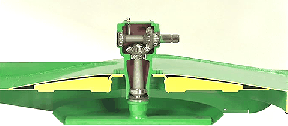 Cross-section of patented Double-Decker design
Cross-section of patented Double-Decker design
The patented Double-Decker design provides strength and superior cutting performance while reducing top deck rust. Two welded decks, each 3-mm (1/8-in.) thick, form the upper and lower surfaces of the rotary cutter frame.
Internal stiffeners are sandwiched between the two decks, providing superior strength and rigidity.
The top deck is domed. Water, grass, and crop debris tend to roll off the deck, reducing water buildup and deck rust. The domed shape and smooth profile of the top deck also make the deck easier to clean when trash does build up in adverse conditions.
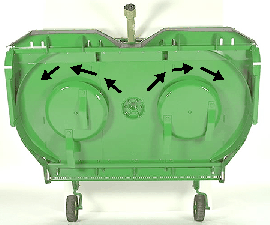 Unobstructed horizontal bottom deck
Unobstructed horizontal bottom deck
The bottom deck is the main defense against rocks and field debris. Therefore, the top deck is continuously protected from impacts and tends to retain its smooth form.
Because the stiffeners are located between the two decks, the underside of the bottom deck is perfectly smooth; there are no structural frame members to interrupt airflow. This improves both cutting performance and distribution.
Standard material flow deflectors help channel the cut material, further improving material distribution.
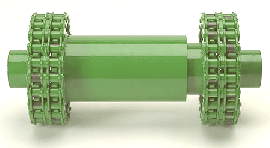 Rubber element driveline with chain couplers
Rubber element driveline with chain couplersRubber element connecting drivelines help absorb the sudden stress of impact loads. Chain couplers are used to maintain the driveline alignment.
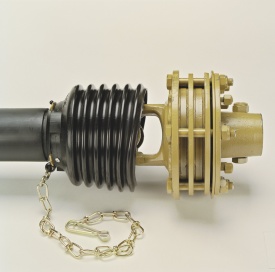 Slip-clutch driveline
Slip-clutch drivelineA non-seize slip clutch used between the primary gearcase and power take-off (PTO) helps protect the driveline. Slip clutches feature a spring-compression adjustment used to ensure clutches are not seized.
Lift-type and semi-mount models feature an ASAE Category 4 driveline for added durability.
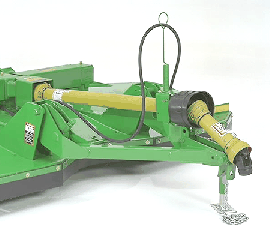 Equal-angle driveline
Equal-angle drivelineThe pull-type model uses an equal-angle driveline for smoother, rattle-free turns.
A lightweight driveline with a lock-slide collar makes it fast and easy to attach.
The driveline provides long lubrication periods; a 50-hour cycle reduces maintenance time, making the cutting operation more efficient.
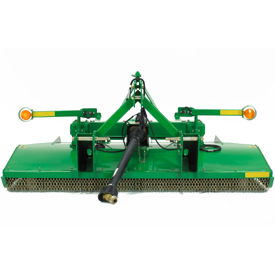 Front safety chains (MX8 shown)
Front safety chains (MX8 shown)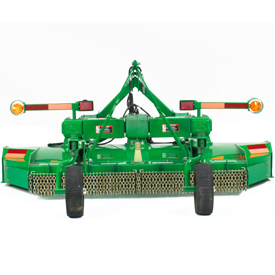 Rear safety chains (MX8 shown)
Rear safety chains (MX8 shown)Front and rear chain shields are standard equipment:
- Offer protection during operation yet allow uncut material to pass into the cutting chamber with minimal restriction
Round-pan blade holders (stump jumpers) are provided as standard equipment on most John Deere rotary cutter models. Stump jumpers increase the drivetrain reliability by providing protection against impacts such as stumps, rocks, and other obstacles.
Five-year limited gearbox warranty provided on every John Deere rotary cutter
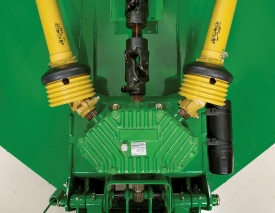 Five-year warranty on all flex-wing gearboxes
Five-year warranty on all flex-wing gearboxes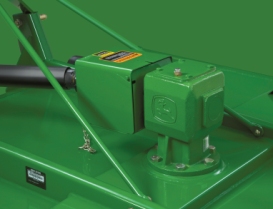 Five-year warranty on all rotary cutter gearboxes
Five-year warranty on all rotary cutter gearboxesJohn Deere is so confident in the reliability of the gearbox that rotary cutters come with a 5-year limited gearbox warranty.
There is also 1-year warranty on the complete machine, as well as drivelines and other components.
Specifications
Compare the specifications of up to 4 models
| Capacity | mx8-rotary-cutter Current Model |
|---|---|
| Cutting width | 2,450 mm 96 in. |
| Cutting height | 25 to 305 mm 1 to 12 in. |
| Cutting capacity | 50 mm 2 in. |
| Cutting chamber Depth | 216 mm 8.5 in. |
| Tractor compatibility | |
| Tractor PTO HP range | Minimum PTO pull-type, semi-mount, semi-mount hydraulic offset 30 kW 40 hp Minium PTO lift-type 37 kW 50 hp |
| Tractor PTO | 540 rpm |
| Hitch | |
| Type | Pull-type, lift-type, semi-mount, semi-mount hydraulic offset (Pull-type has standard 10,000 lb; 4536 kg, safety tow chain) |
| Category | 2, 3, 3N |
| Dimensions | |
| Transport width | 2,580 mm 102 in. |
| Overall width | 2,580 mm 102 in. |
| Overall length | 2,810 mm 111 in. |
| Deck shape | Domed |
| Deck type | Double decker |
| Deck thickness | Upper 3 (11) mm 0.125 (11) in. Lower 3 (11) mm 0.125 (11) in. |
| Side skirt thickness | 4.5 (7) mm 0.177 (7) in. |
| Approx. weight | 759 kg 1,670 lb |
| Drivelines | |
| Size | Main ASAE Category 4 |
| Protection | Main Non-seize, slip-clutch driveline, pull-type has equal-angle Category 4 driveline Connecting Shock absorbing shafts |
| Gearcases | |
| Number | 3 |
| HP rating | Transfer Continuous 89 kW 120 hp Peak 97 kW 130 hp Outer Continuous 56 kW 75 hp Peak 75 kW 100 hp |
| Blades | |
| Thickness | 13 mm 0.5 in. |
| Width | 102 mm 4 in. |
| Type | Suction |
| Overlap | 72 mm 2.8 in. |
| Blade tip speed | 540 RPM 4,797 m/min 15,739 fpm 288 km/h 179 mph |
| Material flow system | Max flow |
| Holder | Type Round stump jumper |
| Wheels | |
| Type | Puncture proof laminated (Pull-type has severe-duty Ag tire option) |
| Row width adjustment | Yes, pull-type only |
| Shielding | |
| Front | Chain |
| Rear | Chain |
| Key Specs | |
| Blade tip speed - 540 rpm | |
| Cutting capacity | |
| Cutting width | |
| Deck thickness - Upper - Lower | |
| Drivelines - Size - Main | |
| Hitch - Category | |
| Protection - Main | |
| Shielding - front/rear | |
| Side skirt thickness | |
| Tractor PTO HP range |
Accessories and Attachments
Miscellaneous
Two required. Also requires (2) M72431 and (2) A15146.
Cylinder Stops - AW31553
 Front safety chain shield
Front safety chain shield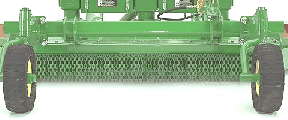 Rear safety chain shield
Rear safety chain shieldSafety shields are used to reduce the hazard of thrown material.
Front chain shields protect the operator, yet still allow uncut material to pass into the cutting chamber with minimal restriction.
Front and rear shields are to be used at all times. They are especially critical when working near roads or other public areas.
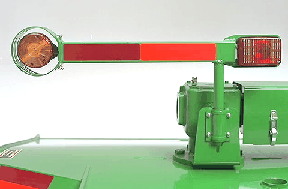 Warning light
Warning lightRecommended for use when transporting and tractor flashing lights are obscured by the implement. Tractor must have 7-pin electrical outlet.
Includes:
- Left and right lights
- Brackets
- Wire harness
- Instructions
Note: Warning lights are standard equipment on HX14 Rotary Cutter.
 Front safety chain shield
Front safety chain shield Rear safety chain shield
Rear safety chain shieldSafety shields are used to reduce the hazard of thrown material.
Front chain shields protect the operator, yet still allow uncut material to pass into the cutting chamber with minimal restriction.
Front and rear shields are to be used at all times. They are especially critical when working near roads or other public areas.
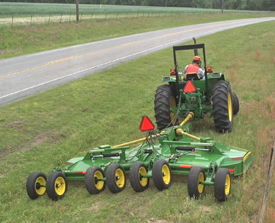 SMV emblem and support
SMV emblem and support
Use SMV emblem to provide additional warning of slow-moving equipment.

